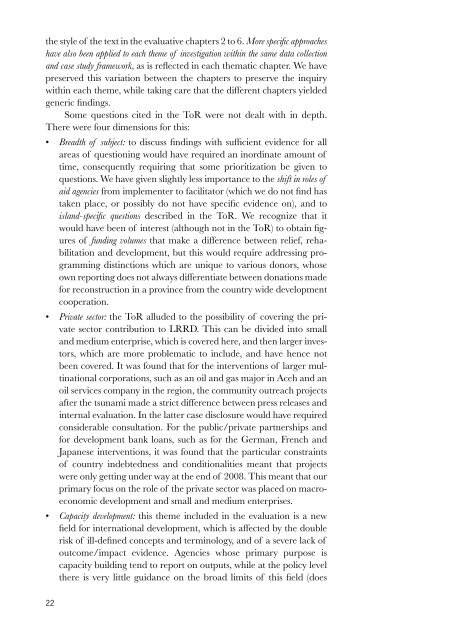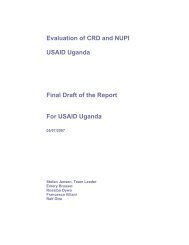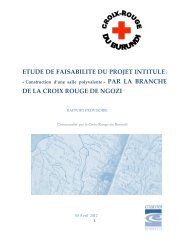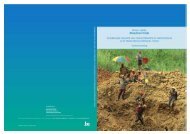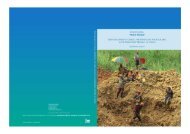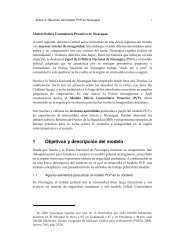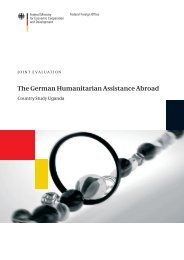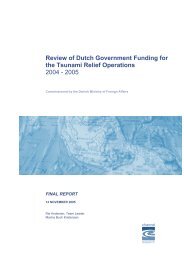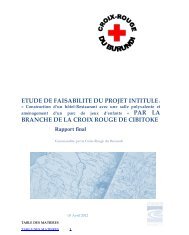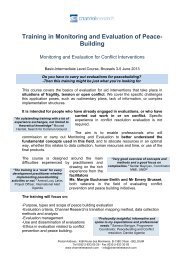A ripple in development? - Channel Research
A ripple in development? - Channel Research
A ripple in development? - Channel Research
You also want an ePaper? Increase the reach of your titles
YUMPU automatically turns print PDFs into web optimized ePapers that Google loves.
the style of the text <strong>in</strong> the evaluative chapters 2 to 6. More specific approaches<br />
have also been applied to each theme of <strong>in</strong>vestigation with<strong>in</strong> the same data collection<br />
and case study framework, as is reflected <strong>in</strong> each thematic chapter. We have<br />
preserved this variation between the chapters to preserve the <strong>in</strong>quiry<br />
with<strong>in</strong> each theme, while tak<strong>in</strong>g care that the different chapters yielded<br />
generic f<strong>in</strong>d<strong>in</strong>gs.<br />
Some questions cited <strong>in</strong> the ToR were not dealt with <strong>in</strong> depth.<br />
There were four dimensions for this:<br />
• Breadth of subject: to discuss f<strong>in</strong>d<strong>in</strong>gs with sufficient evidence for all<br />
areas of question<strong>in</strong>g would have required an <strong>in</strong>ord<strong>in</strong>ate amount of<br />
time, consequently requir<strong>in</strong>g that some prioritization be given to<br />
questions. We have given slightly less importance to the shift <strong>in</strong> roles of<br />
aid agencies from implementer to facilitator (which we do not f<strong>in</strong>d has<br />
taken place, or possibly do not have specific evidence on), and to<br />
island-specific questions described <strong>in</strong> the ToR. We recognize that it<br />
would have been of <strong>in</strong>terest (although not <strong>in</strong> the ToR) to obta<strong>in</strong> figures<br />
of fund<strong>in</strong>g volumes that make a difference between relief, rehabilitation<br />
and <strong>development</strong>, but this would require address<strong>in</strong>g programm<strong>in</strong>g<br />
dist<strong>in</strong>ctions which are unique to various donors, whose<br />
own report<strong>in</strong>g does not always differentiate between donations made<br />
for reconstruction <strong>in</strong> a prov<strong>in</strong>ce from the country wide <strong>development</strong><br />
cooperation.<br />
• Private sector: the ToR alluded to the possibility of cover<strong>in</strong>g the private<br />
sector contribution to LRRD. This can be divided <strong>in</strong>to small<br />
and medium enterprise, which is covered here, and then larger <strong>in</strong>vestors,<br />
which are more problematic to <strong>in</strong>clude, and have hence not<br />
been covered. It was found that for the <strong>in</strong>terventions of larger mult<strong>in</strong>ational<br />
corporations, such as an oil and gas major <strong>in</strong> Aceh and an<br />
oil services company <strong>in</strong> the region, the community outreach projects<br />
after the tsunami made a strict difference between press releases and<br />
<strong>in</strong>ternal evaluation. In the latter case disclosure would have required<br />
considerable consultation. For the public/private partnerships and<br />
for <strong>development</strong> bank loans, such as for the German, French and<br />
Japanese <strong>in</strong>terventions, it was found that the particular constra<strong>in</strong>ts<br />
of country <strong>in</strong>debtedness and conditionalities meant that projects<br />
were only gett<strong>in</strong>g under way at the end of 2008. This meant that our<br />
primary focus on the role of the private sector was placed on macroeconomic<br />
<strong>development</strong> and small and medium enterprises.<br />
• Capacity <strong>development</strong>: this theme <strong>in</strong>cluded <strong>in</strong> the evaluation is a new<br />
field for <strong>in</strong>ternational <strong>development</strong>, which is affected by the double<br />
risk of ill-def<strong>in</strong>ed concepts and term<strong>in</strong>ology, and of a severe lack of<br />
outcome/impact evidence. Agencies whose primary purpose is<br />
capacity build<strong>in</strong>g tend to report on outputs, while at the policy level<br />
there is very little guidance on the broad limits of this field (does<br />
22


